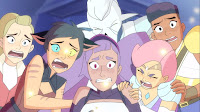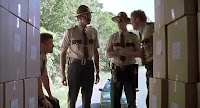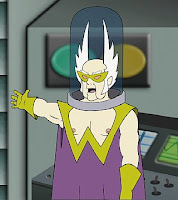So, hey… things are a little crazy and intense in this world of ours right now. Hopefully you’re somewhere safe and hunkering down a bit. Also hopefully you’re not someone going “Ha ha ha look at me” as you wander around potentially endangering other people.
Be a hero. Don’t willfully endanger anyone else right now. Okay?
Anyway… bonus post. Figured everybody could use a little extra stuff to read while they’re stuck at home.
I’d like to share a random writing-type thought that’s bounced back and forth through my head a few times recently. I think it’s something a lot of you may automatically get, but this might help solidify it a bit in your own heads. And for some of you, this may be an all new concept.
I’ve mentioned the idea of repetition in writing here a few times, coming at it from a few different angles. It’s one of those elements that can be very powerful if used the right way… and completely brutal if I use it the wrong way. Or overuse it. It’s like one of those vitamins or minerals that we absolutely need to live, but just a little too much and now it’s a deadly poison.
Anyway, it recently struck me why repetition can turn on us like that and—oddly enough—it ties back to another idea I’ve mentioned here once or thrice. And that’s a concept Damon Knight talked about in one of his short story books. The idea of information vs. noise.
To sum up quickly, it goes like this. When we come across a fact we don’t know, it’s information. When we come across a fact we already know, it’s noise. We pay attention to information, but we tune out noise because… well, it’s noise. It’s just a distraction, keeping us away from the stuff we’re actually here for.
Now, Knight was talking about this mostly in the sense of exposition, and this makes perfect sense. We don’t want to read two pages about why Nazis were bad because, well, we all know that already (okay, most of us know that…). But we’re up for two pages about how true artificial intelligence came into existence, because this is something we don’t know and (hopefully) find interesting and relevant within the context of the story.
Getting hit with the same facts we already know is… well, boring. Sometimes flat-out aggravating. It feels like the author is padding and wasting time rather than giving us what we want.
But here’s the thing. This is true of pretty much all repetition. As I’m putting words down on the page, repeating anything the reader knows (or can figure out) is going to quickly become noise.
Think of names in dialogue. We roll our eyes when characters constantly use names while talking to each other. Or if the author constantly uses dialogue descriptors with names rather than pronouns (or just assuming we can follow who’s talking). After hearing Wakko said… a dozen times on one page, we start grinding our teeth. We can’t help it. It’s noise to our ears.
The same thing holds for descriptions. Yes, I know Phoebe is over six feet tall. You’ve mentioned it seven times in the past ten pages. Or that the blood is bright red. Or that Phoebe is six feet tall. Or that Yakko is a cyborg. Or that one of my over-six-foot characters is Phoebe. See what I mean? I’m clearly doing it as a humorous way to make a point, but it’s kinda getting on your nerves, isn’t it?
 And I’ve talked before about doing this with reveals. The first time I reveal something to my readers is an amazing, jaw-dropping thing. Because it’s facts they don’t know. It’s information. But the second time I show it off it’s… well, it’s not as interesting. And the third time, if there’s no point to this, it’s kinda boring. By the fourth time okay seriously can we just get on with this? What? A fifth time? Seriously?
And I’ve talked before about doing this with reveals. The first time I reveal something to my readers is an amazing, jaw-dropping thing. Because it’s facts they don’t know. It’s information. But the second time I show it off it’s… well, it’s not as interesting. And the third time, if there’s no point to this, it’s kinda boring. By the fourth time okay seriously can we just get on with this? What? A fifth time? Seriously?
Repetition can turn anything I have to say into noise fast. So I want to be very careful if I’m going to repeat any information for a third or fourth time. And like I just joked, if I hit a fifth time…
Wow, I should probably rethink some things.
Next time we’re going to jump back to the A2Q and talk about theme. Yeah, I know. You just had this gut, high school reaction to that word. I’m going to try to help you get past that.
Until then, go write.









